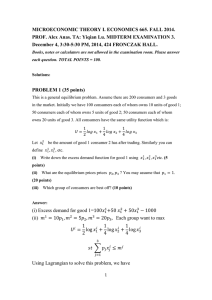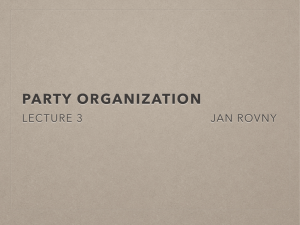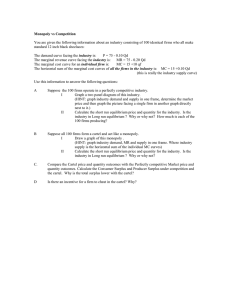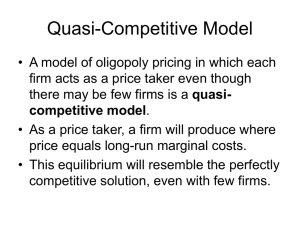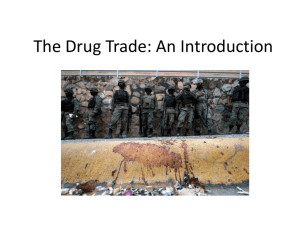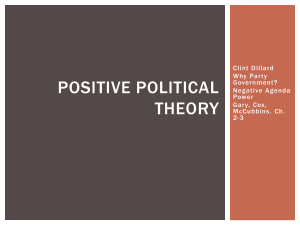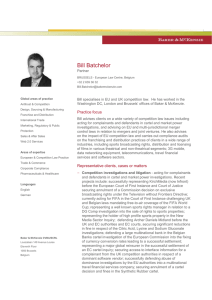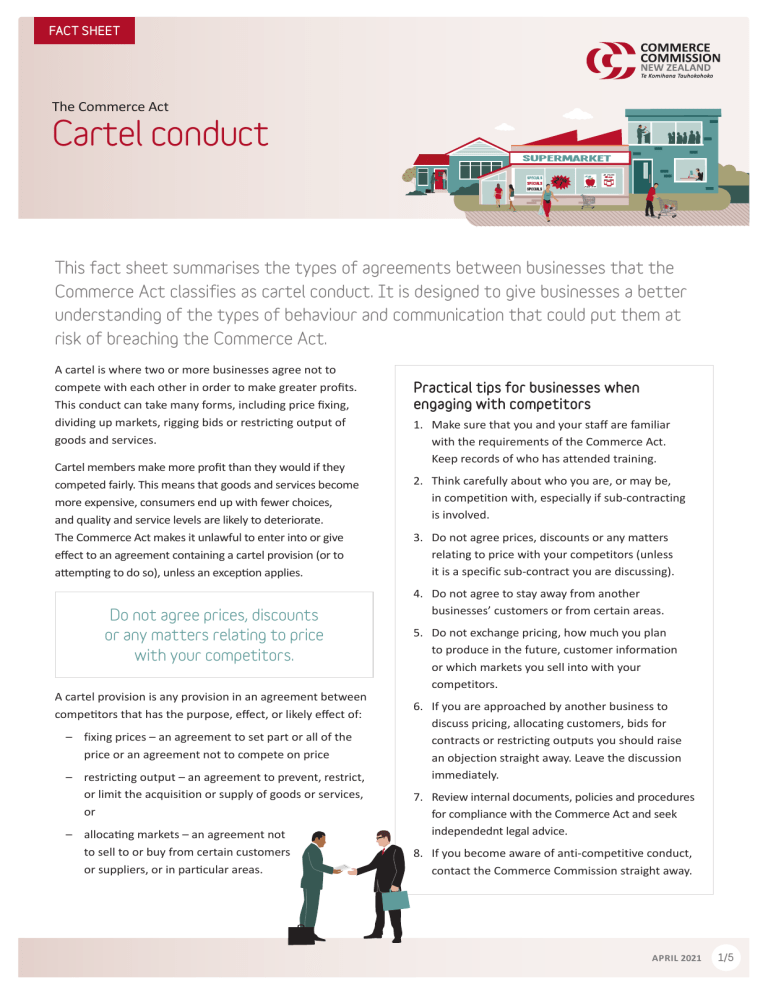
FACT SHEET The Commerce Act Cartel conduct This fact sheet summarises the types of agreements between businesses that the Commerce Act classifies as cartel conduct. It is designed to give businesses a better understanding of the types of behaviour and communication that could put them at risk of breaching the Commerce Act. A cartel is where two or more businesses agree not to compete with each other in order to make greater profits. This conduct can take many forms, including price fixing, dividing up markets, rigging bids or restricting output of goods and services. Cartel members make more profit than they would if they competed fairly. This means that goods and services become more expensive, consumers end up with fewer choices, and quality and service levels are likely to deteriorate. The Commerce Act makes it unlawful to enter into or give effect to an agreement containing a cartel provision (or to attempting to do so), unless an exception applies. Do not agree prices, discounts or any matters relating to price with your competitors. A cartel provision is any provision in an agreement between competitors that has the purpose, effect, or likely effect of: – fixing prices – an agreement to set part or all of the price or an agreement not to compete on price – restricting output – an agreement to prevent, restrict, or limit the acquisition or supply of goods or services, or – allocating markets – an agreement not to sell to or buy from certain customers or suppliers, or in particular areas. The Commerce Act Cartel conduct Practical tips for businesses when engaging with competitors 1. Make sure that you and your staff are familiar with the requirements of the Commerce Act. Keep records of who has attended training. 2. Think carefully about who you are, or may be, in competition with, especially if sub-contracting is involved. 3. Do not agree prices, discounts or any matters relating to price with your competitors (unless it is a specific sub-contract you are discussing). 4. Do not agree to stay away from another businesses’ customers or from certain areas. 5. Do not exchange pricing, how much you plan to produce in the future, customer information or which markets you sell into with your competitors. 6. If you are approached by another business to discuss pricing, allocating customers, bids for contracts or restricting outputs you should raise an objection straight away. Leave the discussion immediately. 7. Review internal documents, policies and procedures for compliance with the Commerce Act and seek independednt legal advice. 8. If you become aware of anti-competitive conduct, contact the Commerce Commission straight away. FACT SHEET APRIL 2021 APRIL 2021 1/5 What is illegal? In competition Section 30 of the Commerce Act prohibits any person entering into a contract or arrangement, or arriving at an understanding, that contains a cartel provision. As set out above, a cartel provision is any provision in an agreement between competitors that has the purpose, effect, or likely effect of fixing prices, restricting output or allocating markets. An agreement to restrict output or allocate markets is illegal regardless of whether the agreement actually affects price. These type of agreements (in addition to price fixing) are deemed to substantially lessen competition and therefore are illegal. → At least two parties to the agreement must be in competition with each other. This means that they compete, or are likely to compete, with each other in the same market, and that the agreement relates to buying or selling goods or services in that market. → If there are more than two parties to the agreement, only two of them need to be in competition with each other. → In assessing whether a firm competes with another firm, each of the firm’s interconnected bodies corporate (eg, subsidiary companies) is taken to be a party to the agreement. An agreement to set output or allocate markets is illegal regardless of whether an effect on price is proven. What do these terms mean? Contract, arrangement or understanding → The terms contract, arrangement, and understanding are used to denote varying degrees of formality. → A contract means a legally enforceable contract (which can be written or oral, implied or express). → An arrangement or understanding is something short of this: the key question is simply whether the parties have a shared expectation as to what at least one of them will do or not do. . This means a business does not need to have a formal written contract with a competitor to breach the Commerce Act. It can simply be an understanding reached between competitors about how each of them will behave. In this fact sheet, the term “agreement” covers the terms contract, arrangement and understanding. > Our Competitor Collaboration Guidelines provide further detail on who may be a competitor or potential competitor. www.comcom.govt.nz Purpose, effect or likely effect → The purpose is the intention or aim of an agreement. The purpose of the agreement is inferred from what actually happened (or was likely to happen) as a result of the behaviour and from any evidence of what each party intended when entering into the agreement. → The effect is the actual result of the particular agreement. → Likely effect involves considering what could happen. An effect is considered likely if there is a real and substantial risk that it would occur. Price fixing Price fixing occurs when parties enter into or give effect to an agreement that interferes with the competitive determination of price by fixing, controlling, or maintaining: – the price of goods and services that two or more of the parties to the agreement supply or acquire in competition with each other, or – any discount, allowance, rebate, or credit of goods or services that two or more of the parties to the agreement supply or acquire in competition with each other. → The Commerce Act Cartel conduct Fixing means to set the price at a certain level, or to agree a formula which sets the price of the goods or services. FACT SHEET APRIL 2021 2/5 → → Controlling means to interfere with the process of how prices are set. This could be interfering with a component of an overall price, such as an agreement between competitors not to offer a discount on a certain good. Maintaining means to preserve the price. An agreement will also breach the Commerce Act if it creates a formula or system which causes or allows a price to be fixed, controlled, or maintained. For example, an agreement that prices will be determined by a third party such as a trade association or an independent accountant would provide for the fixing of prices, and would be prohibited. Types of price fixing agreements Price fixing is not limited to agreements between competitors where a specific price of goods or services is set. Any agreement between competitors that interferes with how a price is reached is illegal under the Commerce Act. In effect, price fixing includes any agreement or behaviour that interferes with how the price is reached by each competitor individually. It includes agreements to: → set a minimum price → eliminate or reduce discounts → adopt a formula for calculating price → increase prices, or → maintain prices. EXAMPLE Real Estate cartel In 2015 the Commission filed proceedings for price fixing by thirteen national and regional real estate agencies, a company owned by a number of national real estate agencies and three individuals. The case arose from the agencies’ reaction to an increase in Trade Me listing fees announced in 2013. The agencies agreed that they would pass on the fees to list properties on Trade Me to the seller. This controlled or maintained the price that agencies would charge to vendors so interfered with competition. This case set out that even if parties agree a starting point ie to charge the Trade Me fee to vendors that was still a breach of section 30 It is not a defence that parties could discount the price in certain circumstances. Output restrictions Output restrictions between competing suppliers of goods or services occur where two or more of those competing suppliers arrange to prevent, restrict, or limit: – their supply, production, or likely supply or production of those goods, or – their supply, capacity, or likely supply or capacity to supply those services. Output restrictions between competing buyers of goods or services occur where two or more competing buyers of goods or services arrange to prevent, restrict, or limit their acquisition or likely acquisition of those goods or services. EXAMPLE Tasmanian salmon growers cartel In 2003 the Australian Competition and Consumer Commission (ACCC) commenced proceedings against salmon producer Tassal and the Tasmanian Salmonid Growers Association, alleging the members of the association entered into an agreement to limit the supply of salmon and to fix, control, or maintain the price of salmon. The ACCC alleged that Tassal and the Association had agreed that the five major growers would ‘grade out’ 10% of salmon from the 2001 year class, and that they would later consider a possible grading out of a further 5%. The purpose of these agreements was to reduce fish numbers to ensure the financial viability of the salmon farming industry in Tasmania. At the time the agreement was entered into, the Tasmanian salmon industry was in financial difficulty and supply was outstripping demand. The Federal Court of Australia held that there was an agreement or understanding between competitors. The agreement was to limit the supply of fish and it would likely have had the effect of controlling or maintaining price, in breach of the anti-competitive provisions of the Australian Trade Practices Act 1974. The companies and individuals were ordered to pay a total of nearly $23 million in penalties. The Commerce Act Cartel conduct FACT SHEET APRIL 2021 3/5 Market allocation Bid rigging Market allocation occurs where two or more competing suppliers or buyers arrange to allocate between themselves the customers to whom, or the geographic areas in which, each will supply their respective goods or services. A particular situation where market allocation can arise is when parties are competing for contracts, such as competing for tenders. Bid rigging, or collusive tendering, will almost always involve a cartel provision to either fix price, restrict output, or allocate a market. This provision will be contained in an agreement between businesses as to which of them should win the bid, eliminating competition among the colluding bidders. EXAMPLE The prohibition covers agreements between suppliers to allocate sales to any persons, including distributors and re‑suppliers. Customer allocation between competing suppliers For about 10 years until 1997 most of the companies in the fire alarm and fire sprinkler installation industry in Brisbane held regular meetings at which they agreed to allow certain tenders to be won by particular competitors. Market allocation not only concerns sales to final customers. The prohibition covers agreements between suppliers to allocate sales to any persons, including distributors and re‑suppliers. Calling themselves the ‘Sprinkler Coffee Club’ and the ‘Alarms Coffee Club’, the groups would meet up over coffee at hotels, cafes, and various sporting and social clubs. At these meetings they would share tenders and decide who was to submit ‘cover prices’ (prices just above the winning bid amount) to make the tender process look legitimate, while ensuring the agreed company won the tender. EXAMPLE Customer allocation between competing suppliers In Commerce Commission v Eli Lilly & Co (NZ) Ltd, two wholesale suppliers of animal remedies reached an agreement by which one supplier would only proactively sell the Elanco brand of animal remedy products to large purchasers (ie, those that spent $10,000 or more per annum on Elanco products), while the other would only proactively sell to those below that threshold. The agreement was held to constitute market allocation through dividing the market by customer. > Our Competitor Collaboration Guidelines set out more detail on types of Cartel Conduct. www.comcom.govt.nz Are there any exemptions? There are some exemptions in the Act where an agreement between competitors may not be illegal. These include: → collaborative activities (section 31) → vertical supply contracts (section 32) → joint buying and promotion agreements (section 33) → partnership arrangements between individuals (section 44(1)(a)) → belief on reasonable grounds that an exception to the Commerce Act applied. This applies to criminal proceedings only (section 82C). There are a number of more specific exemptions – see more on our website. Competitor Collaboration Guidelines also set out more detail on these exemptions. Businesses should seek legal advice if they are considering entering into an agreement with competitors on the basis that they believe the agreement falls under any of these exemptions. The Commerce Act Cartel conduct FACT SHEET APRIL 2021 4/5 Clearances under the Commerce Act A party proposing to enter into an agreement containing a cartel provision that is part of a collaborative activity can apply for clearance for that agreement. This is a voluntary regime and there is no statutory requirement to seek clearance. Where we clear an agreement, parties to the agreement will not contravene the cartel prohibition or the prohibition on agreements that substantially lessen competition. In essence, a clearance provides certainty that the agreement is lawful under the Commerce Act. Our Competitor Collaboration Guidelines also set out more detail on our clearance regime. Authorisations under the Commerce Act For such cases, the Commission has a secure anonymous whistleblowing tool which uses encryption methods to allow you to submit a report anonymously. The information provided through this online tool cannot be traced back to you, as long as you do not enter any information that identifies you. The Commission will not accept leniency applications from parties involved in cartel conduct made via the anonymous whistleblower tool – they need to instead make an application to the General Manager Competition and Consumer. See more on our website. > Read the Commission’s Cartel Leniency Policy and Guidelines. www.comcom.govt.nz Penalties Under the Commerce Act, the Commission can authorise an anti-competitive agreement where it is satisfied that the benefits to the public outweigh the harm of the agreement. If the courts find an individual or body corporate has breached the Commerce Act, penalties can be heavy: > Read more about authorisations. www.comcom.govt.nz Cartel Leniency Policy and Guidelines → for a body corporate, the greater of: – three times the commercial gain, or, if this cannot be easily established, 10% of turnover of the person and all its interconnected bodies corporate (if any) in each accounting period in which the contravention occurred. The first cartel member to inform us about the cartel can receive leniency from civil proceedings from the Commission and immunity from criminal prosecution from the Solicitor General. To qualify for immunity, the cartel member must fully cooperate in the investigation and any subsequent proceedings. We recognise there are situations where someone who has knowledge or specific information about a cartel might be reluctant to report it for fear of negative consequences or reprisals. However, this knowledge may be key to detecting and breaking up cartels. for an individual, up to 7 years in prison and financial penalties of up to a maximum of $500,000 – $10 million, or The Commission’s Cartel Leniency Policy and Guidelines encourages those in a cartel to stop their involvement, break up the cartel and limit the damage caused by the cartel. Reporting cartel conduct anonymously → Every separate breach of the Act (even if done by the same person) may incur a penalty and criminal and civil financial penalties are the same. Agreements prior to 15 August 2017 If you entered into or gave effect to any agreement prior to 15 August 2017, it is prohibited by the previous section 30 price fixing prohibition. If you are uncertain about either of these prohibitions, you should seek legal advice. This fact sheet provides guidance only. It is not intended to be definitive and should not be used in place of legal advice. You are responsible for staying up to date with legislative changes. You can subscribe for information updates at www.comcom.govt.nz/subscribe Contact us with information about possible breaches of the laws we enforce: Phone: 0800 943 600 Write: Enquiries Team, PO Box 2351, Wellington 6140 Email: contact@comcom.govt.nz The Commerce Act Cartel conduct FACT SHEET APRIL 2021 5/5

